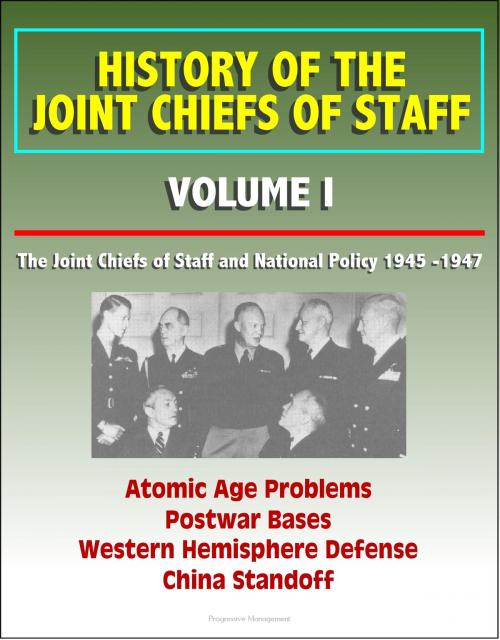History of the Joint Chiefs of Staff: Volume I: The Joint Chiefs of Staff and National Policy 1945 -1947 - Atomic Age Problems, Postwar Bases, Western Hemisphere Defense, China Standoff
Nonfiction, History, Military, Nuclear Warfare, United States| Author: | Progressive Management | ISBN: | 9781301121014 |
| Publisher: | Progressive Management | Publication: | September 17, 2013 |
| Imprint: | Smashwords Edition | Language: | English |
| Author: | Progressive Management |
| ISBN: | 9781301121014 |
| Publisher: | Progressive Management |
| Publication: | September 17, 2013 |
| Imprint: | Smashwords Edition |
| Language: | English |
Established during World War II to advise the President regarding the strategic direction of armed forces of the United States, the Joint Chiefs of Staff (JCS) continued in existence after the war and, as military advisers and planners, have played a significant role in the development of national policy. Knowledge of JCS relations with the President, the National Security Council, and the Secretary of Defense in the years since World War II is essential to an understanding of their current work. An account of their activity in peacetime and during times of crisis provides, moreover, an important series of chapters in the military history of the United States. For these reasons, the Joint Chiefs of Staff directed that an official history be written for the record. Its value for instructional purposes, for the orientation of officers newly assigned to the JCS organization, and as a source of information for staff studies will be readily recognized. The series, The Joint Chiefs of Staff and National Policy, treats the activities of the Joint Chiefs of Staff since the close of World War II. Because of the nature of the activities of the Joint Chiefs of Staff as well as the sensitivity of the sources, the volumes of the series were originally prepared in classified form. Classification designations, in text and footnotes, are those that appeared in the original classified volume. Following review and declassification, the initial four volumes, covering the years 1945-1952 and the Korean War, were distributed in unclassified form within the Department of Defense and copies were deposited with the National Archives and Records Administration. These volumes are now being made available as official publications.
Volume I describes JCS activities during the period 1945-1947 except for activities related to Indochina, which are covered in a separate series.
Contents * 1. The Joint Chiefs of Staff in 1945 * Relationships with the President * The Joint Chiefs of Staff and the Secretaries of War, Navy, and State * JCS Relations with the State-War-Navy Coordinating Committee (SWNCC) * JCS Participation in the United Nations * Future Prospects * 2. Between War and Peace * Initial US Views of the Postwar World * Differences over Eastern Europe: First Signs of Rift between East and West * A Cautious Reappraisal of Soviet Intentions * The Yalta Conference * Worsening Relations over Eastern Europe * Occupation Plans for Germany and Austria * The Venezia Giulia Confrontation * Creation of the United Nations * Preliminaries to the Potsdam Conference. * JCS Views of Soviet Demands on Turkey * The Meeting at Potsdam * The War Ends * 3. US-Soviet Confrontation Intensifies: September 1945-March 1947 * The London Conference of the Council of Foreign Ministers * A Problem in Czechoslovakia * Defining US Foreign Policy * The Moscow Conference of Foreign Ministers * Trouble in Iran * Soviet Policies: Several Views * More Problems in Iran * The Paris Meeting of the Council of Foreign Ministers * Trouble in Venezia Giulia * The JCS Appraise the Soviet Threat—July 1946 * Possible Aid to Turkey and Iran * The Truman Doctrine Evolves * 4. US Military Policy: Strategic Planning and Command Arrangements * Authority for JCS Participation in Postwar Military Policymaking * The Effects of "New Weapons" on Policy and Strategy * The JCS Propose a US Postwar Military Policy * The JCS Strategic Concept and Plan * Concept of Operations for a Joint Outline War Plan * The JCS Strategic Estimate for the President * Joint Basic Outline War Plan PINCHER * The JCS Advise President Truman on Military Policy * Strategic Guidance for Industrial Mobilization Planning * Unified Command * Strategic Concept and Deployment Planning for the Pacific * 5. Postwar Military Forces: Planning and Problems * US Armed Forces on V-J Day * Early Demobilization Planning * Planning for Demobilization after the Defeat of Japan
Established during World War II to advise the President regarding the strategic direction of armed forces of the United States, the Joint Chiefs of Staff (JCS) continued in existence after the war and, as military advisers and planners, have played a significant role in the development of national policy. Knowledge of JCS relations with the President, the National Security Council, and the Secretary of Defense in the years since World War II is essential to an understanding of their current work. An account of their activity in peacetime and during times of crisis provides, moreover, an important series of chapters in the military history of the United States. For these reasons, the Joint Chiefs of Staff directed that an official history be written for the record. Its value for instructional purposes, for the orientation of officers newly assigned to the JCS organization, and as a source of information for staff studies will be readily recognized. The series, The Joint Chiefs of Staff and National Policy, treats the activities of the Joint Chiefs of Staff since the close of World War II. Because of the nature of the activities of the Joint Chiefs of Staff as well as the sensitivity of the sources, the volumes of the series were originally prepared in classified form. Classification designations, in text and footnotes, are those that appeared in the original classified volume. Following review and declassification, the initial four volumes, covering the years 1945-1952 and the Korean War, were distributed in unclassified form within the Department of Defense and copies were deposited with the National Archives and Records Administration. These volumes are now being made available as official publications.
Volume I describes JCS activities during the period 1945-1947 except for activities related to Indochina, which are covered in a separate series.
Contents * 1. The Joint Chiefs of Staff in 1945 * Relationships with the President * The Joint Chiefs of Staff and the Secretaries of War, Navy, and State * JCS Relations with the State-War-Navy Coordinating Committee (SWNCC) * JCS Participation in the United Nations * Future Prospects * 2. Between War and Peace * Initial US Views of the Postwar World * Differences over Eastern Europe: First Signs of Rift between East and West * A Cautious Reappraisal of Soviet Intentions * The Yalta Conference * Worsening Relations over Eastern Europe * Occupation Plans for Germany and Austria * The Venezia Giulia Confrontation * Creation of the United Nations * Preliminaries to the Potsdam Conference. * JCS Views of Soviet Demands on Turkey * The Meeting at Potsdam * The War Ends * 3. US-Soviet Confrontation Intensifies: September 1945-March 1947 * The London Conference of the Council of Foreign Ministers * A Problem in Czechoslovakia * Defining US Foreign Policy * The Moscow Conference of Foreign Ministers * Trouble in Iran * Soviet Policies: Several Views * More Problems in Iran * The Paris Meeting of the Council of Foreign Ministers * Trouble in Venezia Giulia * The JCS Appraise the Soviet Threat—July 1946 * Possible Aid to Turkey and Iran * The Truman Doctrine Evolves * 4. US Military Policy: Strategic Planning and Command Arrangements * Authority for JCS Participation in Postwar Military Policymaking * The Effects of "New Weapons" on Policy and Strategy * The JCS Propose a US Postwar Military Policy * The JCS Strategic Concept and Plan * Concept of Operations for a Joint Outline War Plan * The JCS Strategic Estimate for the President * Joint Basic Outline War Plan PINCHER * The JCS Advise President Truman on Military Policy * Strategic Guidance for Industrial Mobilization Planning * Unified Command * Strategic Concept and Deployment Planning for the Pacific * 5. Postwar Military Forces: Planning and Problems * US Armed Forces on V-J Day * Early Demobilization Planning * Planning for Demobilization after the Defeat of Japan















